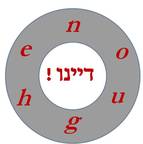

“The Ramban teaches us that it is easy to be fooled into thinking that if we are consuming what is permissible, the quantity of our consumption does not matter. But according to Ramban, one who abuses the resources of the world by rationalizing that these resources are not explicitly forbidden is deemed ‘naval bereshut haTorah’—a ‘vile person within the delineations of the Torah.’ To prevent such overconsumption, Ramban notes that the Torah adds the general commandment of kedusha, ‘That we should be separated from excess….'”
—Ruth Messinger, President of American Jewish World Service

“So much that is wrong with our world—ecologically, socially, economically, politically—can be summed up by the fact that there are few with far more than enough, and so many without nearly enough. This leads us to one crucial question, a question that mainstream economics doesn’t know how to formulate, the educational system doesn’t think of confronting (or is scared to), and that religious institutions shy away from. But it is perhaps the most significant spiritual and political question of our age. To define and to redress ‘too much’ and ‘too little,’ we need to be asking ourselves and each other: What is enough?”
—Jeremy Benstein, Co-Founder and Executive Director of the Heschel Center (Israel)

“Dear Rabbi,” the American asked, “where are all your things?”
“Where are all yours?” the rabbi replied.
“Mine? I am just a visitor.”
“So am I,” replied the Hafetz Hayim.
“My house is not as modest as the Hafetz Hayim’s, nor my possessions as sparse. But I think of this story often, and wonder, especially at this stage in life, just how much stuff I need. My grateful answer is: not much. Bring me gifts? Buy more things? No, thank you. Dayenu. I have all I need. I am blessed. I am full.
—Rabbi Nina Beth Cardin, Founder and Director of the Baltimore Jewish Environmental Network
From Our Facebook Page:
“Enoughness can be contrasted with restlessness. To be restless is to never be satisfied, to strive for more, to refuse to rest on one’s laurels. We need a restless part of our personalities, of our communities, of our economies. But relentless restlessness is damaging.”
—Robin Moss
“It is enough already. We cannot continue to buy, and revel in the freedom of our choices, when it is built on others’ slavery.”
—Rabbi Debbie Young-Somers
“I… have moments that feel overflowing and more than enough…It can be with people…seeing or being seen; or within nature…of being enamored by their beauty, aliveness, intricacy, and otherness.”
—Moshe Givental
The Sova (Enoughness) Project is a joint initiative of the Center for Global Judaism at Hebrew College, the Baltimore Jewish Environmental Network, and the Heschel Sustainability Center. Inspired by the upcoming Shmita year, which commences in September 2014 following Rosh Hashanah, the goal of the project is to raise awareness across the global Jewish community about issues of environmental, economic and spiritual sustainability.
This post has been contributed by a third party. The opinions, facts and any media content are presented solely by the author, and JewishBoston assumes no responsibility for them. Want to add your voice to the conversation? Publish your own post here. MORE
